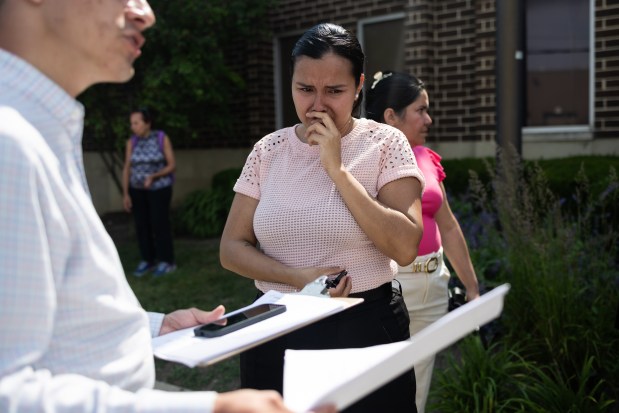CAIRO (AP) — Hamas said Saturday that it was reviewing a new Israeli proposal for a cease-fire in Gaza, as Egypt intensified efforts to broker a deal to end the months-long war and stave off a planned Israeli ground offensive into the southern city of Rafah.
Senior Hamas official Khalil al-Hayya gave no details of Israel’s offer, but said it was in response to a proposal from Hamas two weeks ago. Negotiations earlier this month centered on a six-week cease-fire proposal and the release of 40 civilian and sick hostages in exchange for freeing hundreds of Palestinian prisoners in Israeli jails.
Hamas’ statement came hours after a high-level Egyptian delegation wrapped up a visit to Israel where it discussed a “new vision” for a prolonged cease-fire in Gaza, according to an Egyptian official, who spoke on condition of anonymity to freely discuss the developments.
It wasn’t immediately clear whether Israel’s new proposal was directly related to Friday’s visit by Egyptian mediators.
The discussions between Egyptian and Israeli officials focused on the first stage of a multi-phase plan that would include a limited exchange of hostages held by Hamas for Palestinian prisoners, and the return of a significant number of displaced Palestinians to their homes in northern Gaza “with minimum restrictions,” the Egyptian official said.
The mediators are working on a compromise that will answer most of both parties’ main demands, which could pave the way to continued negotiations with the goal of a larger deal to end the war, the official said.
There has been growing international pressure for Hamas and Israel to reach an agreement on a cease-fire and avert a possible Israeli attack on Rafah, where more than half of Gaza’s 2.3 million people have sought refuge after fleeing fighting elsewhere in the territory.
Israel has been insisting for months it plans a ground offensive into Rafah, on the border with Egypt, where it says many remaining Hamas fighters are holed up, despite calls for restraint from the international community including Israel’s staunchest ally, the United States.
Egypt has cautioned an offensive into Rafah could have “catastrophic consequences” on the humanitarian situation in Gaza, where famine is feared, as well as on regional peace and security.
The Israeli military has massed dozens of tanks and armored vehicles in southern Israel close to Rafah, and hit locations in the city in near-daily airstrikes.
Early Saturday, an Israeli airstrike hit a house in Rafah’s Tel Sultan neighborhood, killing a man, his wife and their three sons, ages 12, 10 and 8, according to records of the Abu Yousef al-Najjar hospital’s morgue. A neighbor’s 4-month-old girl was also killed, the records showed.
Ahmed Omar rushed with other nearby residents to the house after the 1:30 a.m. strike to look for survivors, but said they only found bodies and body parts.
“It’s a tragedy,” he said.
Five people were also killed in the Nuseirat refugee camp in central Gaza overnight when an Israeli strike hit a house, according to officials at the al-Aqsa Martyrs Hospital.
Elsewhere, Israeli forces shot and killed two Palestinian men in an exchange of fire at a checkpoint in the Israeli-occupied West Bank, the military said. It said the men were killed after they opened fire from a vehicle at troops stationed at Salem checkpoint near the Palestinian city of Jenin.
Violence in the West Bank has flared since the war started. Since then, 491 Palestinians have been killed by Israeli fire in the territory, according to the Ramallah-based Health Ministry.
Washington has been critical of Israeli policies in the West Bank, and U.S. Secretary of State Antony Blinken, who is expected in Israel on Tuesday, recently determined an army unit committed rights abuses there before the war in Gaza.
But Blinken said in an undated letter to U.S. House Speaker Mike Johnson, obtained by The Associated Press on Friday, that he’s postponing a decision on blocking aid to the unit to give Israel more time to right the wrongdoing.
Blinken stressed in the letter that overall American military support for Israel’s defense against Hamas and other threats wouldn’t be affected by the U.S. State Department’s eventual decision on the unit.
The U.S. has also been building a pier to deliver aid to Gaza through a new port, which an official said last week was on track to start operating by early May.
The Biden administration has stressed there will be no American boots on the ground for the mission. However, the BBC reported Saturday that the U.K. government was considering deploying troops to drive the trucks to carry the aid to shore, citing unidentified government sources. British officials declined to comment on the report.
Hamas said Friday that it was open to any “ideas or suggestions” that take into consideration the needs of the Palestinian people. The group has said it won’t back down from demands for a permanent cease-fire and full withdrawal of Israeli troops. Israel has rejected both and said that it will continue military operations until Hamas is defeated and that it will retain a security presence in Gaza afterward.
Student protests over the war have emerged on a growing number of college campuses in the U.S., while demonstrations continue in many countries.
Hamas sparked the war with its attack into southern Israel on Oct. 7, in which fighters killed around 1,200 people, mostly civilians, and took around 250 hostage. Israel says the fighters still hold around 100 hostages and the remains of more than 30 others.
More than 34,000 Palestinians have been killed in Israel’s air and ground offensive, according to the Health Ministry in Hamas-run Gaza, around two-thirds of them children and women. Its count doesn’t distinguish between civilians and combatants. The ministry said that 32 people killed in Israeli strikes had been brought to local hospitals over the past 24 hours.
Israel blames Hamas for civilian casualties, accusing it of embedding in residential areas. Israel has reported at least 260 soldiers killed since the start of ground operations.
David Rising reported from Bangkok. Jack Jeffery in Jerusalem, and Danica Kirka in London, contributed to this report.




